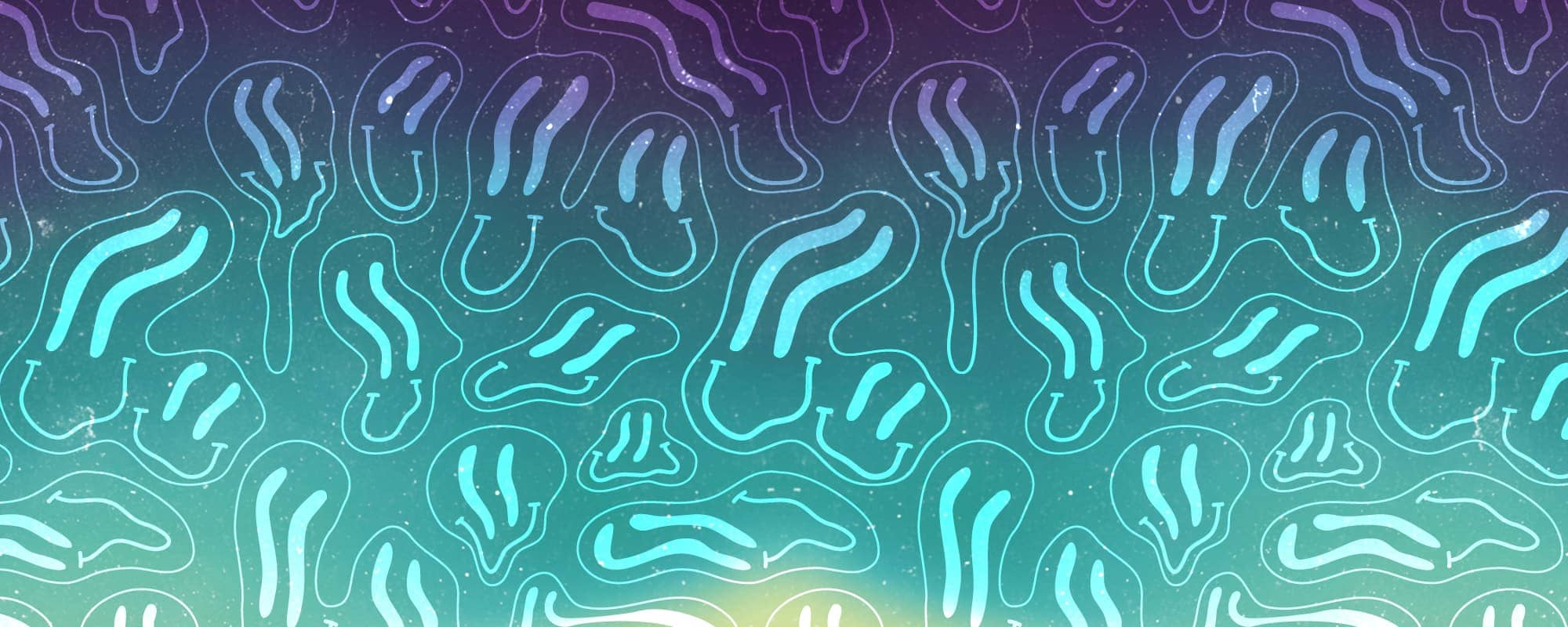What kinds of happiness are there, and what kinds of happiness should we prioritise? Jonathan Firbank explores Masahiro Morioka’s ‘happiness drug’ thought experiment in the face of an increasingly medicated world.
It could be argued that happiness is our only goal. The vast majority of us seek moments of gratification, memories of which punctuate our lives. An evening made exceptional from impromptu adventure, a sexual partner, a mind-altering substance, or deep conversation. Hierarchy amongst these moments is subjective. A person might feel the same elation at their favourite sports team winning as the athletes feel themselves. Memories of a view, a book, or a joke can last as long as memories of marriage and childbirth. Or we can seek happiness by avoiding these ‘frivolous’ moments, instead seeking interpersonal or professional success. Maybe seeking security in our self-image or strength, maybe the security of a supportive partner or a roof over our heads. Comfort, vindication, righteous anger, schadenfreude, and simple relief are all measures of happiness.
Each of us have subtle distinctions between what we consider happiness and how much we value it. There is a clear philosophical difference between those of us who prioritise ‘earning’ happiness and those who seek moments of happy relief or indulgence. Personally, I have a strong memory from the first weeks of my studies in Britain. A lecturer proudly declared that all his free time was spent in research or discussion. He ‘didn’t understand’ people who watched TV, played games or, in fact, did anything gratifying that didn’t actively improve them. Conversely, many of us live for evenings and weekends, consuming sedative entertainment at home or having explosive nights out to balance less gratifying routines.
The Pharma Era
Our new century has seen rapid developments in pharmaceutical mental health treatments, which intensifies this philosophical difference. What are the consequences of a ‘happiness pill’? Does happiness have worth if it isn’t earned? What if prescribed happiness makes us tolerate lives that should be better? In sci-fi dystopias like Brave New World, the population take sedatives, enabling oppressive regimes. The drugs prophesied in these stories pale in strength when compared to Fentanyl, the drug sweeping the US after pharmaceutical companies cynically pushed it into vulnerable hands. The consequences of distributing lethal opioids are clear, but comparatively safe ‘happiness pills’, such as selective serotonin reuptake inhibitors (SSRIs), raise subtler questions. SSRIs such as Prozac/Fluoxetine or Zoloft/Sertraline are used in record-breaking amounts year after year. These have proved invaluable to many people when responsibly prescribed, but when considered with a philosophical perspective, some have found them concerning. What if medication becomes too easy a route to ‘happiness’? Would it dull the richness of human experience or disincentivise personal growth?
A Mental Experiment
In response to the proliferation of these drugs and this criticism of them, Prof. Masahiro Morioka (Professor of Philosophy and Ethics, Waseda University, Japan) wrote Human Dignity and the Manipulation of the Sense of Happiness. In it, Morioka explores the philosophical ethics of medicating mental health. He begins by making a distinction between two kinds of happiness. First, the subjective feeling of happiness, ‘an inner mental state defined by pleasure or pain’. Examples of this might include the dopamine rush from laughter or tasting something delicious. Morioka then describes what he refers to as ‘objective happiness’, relating to the more abstract concepts of success, improvement, and esteem that my lecturer valued. Here he describes Aristotle’s ‘outer concept’ of happiness. Rather than happiness in a moment, this is the ‘complete’ happiness of a life ‘active in accordance with complete virtue and sufficiently equipped with external goods.’ The actions that create this life may create pleasure, but ‘objective happiness’ refers to the actions themselves. This brings Morioka to Kant, who argued we have a ‘fundamental moral duty to cultivate our own perfection.’
Moroika presents a thought experiment: imagine a ‘perfect happiness’ drug was invented, one that perfected your mood with no negative side effects. This drug might be administered in the most terrible circumstances a person can experience and instantly make them as happy as humanly possible, incapable of physical or emotional pain. If this drug was available, what would it do to us? Being free from concern and guilt would certainly let us do evil things, and being free from pain and vigilance would certainly let people do evil things to us. The mental image of smiling from torture or laughing from grief could not be more disturbing. Most pertinently for Morioka, it would take away the dignity of a full range of human emotions, the dignity of self-determination. We may instead become what Kant described as ‘a plaything of the mere inclinations and hence a thing’, locked in feelings of pleasure but never able to experience Aristotle’s ‘objective’, hard-earned happiness.
The dark consequences of a ‘happiness drug’ have been a recurring trope for over a century of speculative science fiction. By refining it into this simple experiment Morioka asks the same question: Where will this lead, and what if it’s bad?
The Other Extreme
But boiling these questions down into such a stark, brutal idea is misleading. Of course this drug, the purest and strongest form of unearned happiness, could lead to great misery. But the purest and strongest form of ‘earned’ happiness (pursuing our ‘moral obligation to cultivate perfection’) could be equally dangerous. The logical conclusion of strict, puritanical ethics is totalitarianism. We are all flawed, so our definitions of perfection are flawed. When society becomes too preoccupied with flawed standards of perfection, it judges those who fall short too harshly. The consequences of this are littered throughout history.
When people like my lecturer boast that the long, arduous dopamine cycle of self-improvement is superior to guilty pleasures, we are culturally motivated to agree. But that perspective is subjective and elitist. One person’s ‘cultivation of perfection’ is another person’s folly – unlike Aristotle and Kant, we live in a globalised, pluralistic society, with radical differences in our values. And those of us with more gruelling lives don’t need condemnation for ‘wasting’ free time on easy pleasures. A more nuanced, useful, and fun philosophy is Oscar Wilde’s: ‘Everything in moderation, even moderation.’
Misrepresenting SSRIs
It’s important to clarify that Morioka’s text isn’t judgemental or puritanical. He is careful not to directly criticise SSRIs or their users, and thinks they are an appropriate short term measure for dealing with trauma. However, presenting his thought experiment in response to SSRIs implies that they are, or will lead to, a form of ‘Happiness Drug’. This scepticism is understandable but not necessarily justified. I have been treated with SSRIs and can state that SSRIs don’t act as a constant happiness pill like the one in Brave New World. Nor do they act as an on/off happiness switch, like horrifically addictive Fentanyl. SSRIs treat disorders. Symptoms like anxiety, depression, or obsessive compulsion aren’t always temporary. These disorders keep people from leading the ‘complete lives’ that Morioka and my old lecturer value so highly. Sufferers are left with brief, ‘frivolous’, ‘undignified’ moments of pleasure and happiness – or none at all. SSRIs, when appropriately prescribed and dosed, diminish these symptoms. This, in turn, allows people to respond to therapy or to change the circumstances damaging them. In this way, SSRIs contribute to Aristotle’s ‘objective happiness’ more than to feelings of subjective pleasure. Mental health disorders are an illness and should be treated as such. They are not always a purely rational response to stimuli. Even when they are, during times of grief or trauma, SSRIs rarely eradicate that pain. They just provide a softer landing, far softer than alcohol abuse, for example, which has been the de-facto drug for millennia and harms people’s agency, welfare, and dignity more than SSRIs ever could.
And anyway, what’s wrong with the occasional ‘happiness switch’, if used safely? We shouldn’t feel guilty for small pleasures, and we should be sceptical of those claiming to be free of them. Even Aristotle drank wine.





Comments are closed for this article!